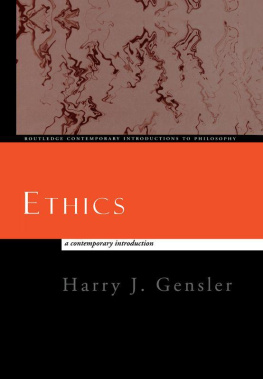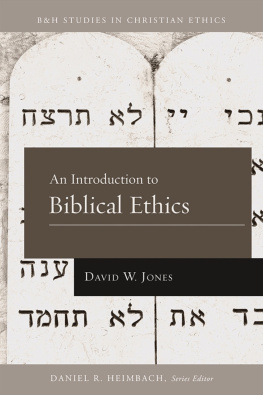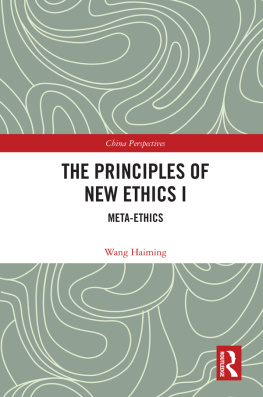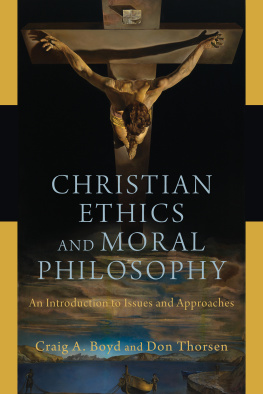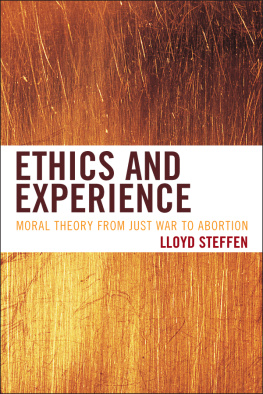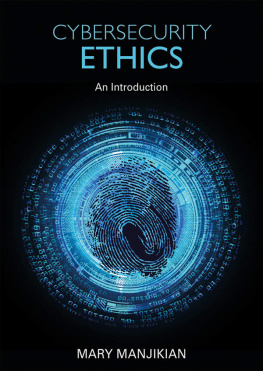
ETHICS
An excellent text. It involves the student in thinking about ethics and not just studying what philosophers have said about the subject. It reinforces the conviction that reasonable, undogmatic answers can be given to the main questions of ethics.
Robert Arrington, Georgia state University
Unusually rigorous. The best and most thorough treatment of foundational issues that 1 have seen in a textbook. The discussion of abortion is outstanding.
Thomas Carson, Loyola University of Chicago
Accessibly and engagingly written.
Mark Walker, University of Birmingham
With its accompanying electronic exercises, it provides a useful tool for students struggling to come to terms with the different metaethical positions.
Jeanette Kennett, Monash University
Ethics introduces the issues and controversies of contemporary moral philosophy. It will help students to think more clearly about how to form their moral beliefs in the wisest and most rationa1 way. The basic approaches to metaethics and normative ethics are related to specific issues, but particularly those of racism, moral education and abortion. Written in a clear and concise way by an experienced textbook author, Ethics will also appeal to the general reader.
There is an associated Web site featuring computer exercises at: http://www.routledge.com/routledge/philosophy/cip/ethics.htm
Harry J. Gensler , S.J., is Professor of Philosophy at John Carroll University in Cleveland. He is the author of Logic: Analyzing and Appraising Arguments (1989), Symbolic Logic: Classical and Advanced systems (1990), and Formal Ethics (1996).
Routledge Contemporary Introductions to Philosophy
Series Editor:
Paul K Mose
Loyola University of Chicago
This innovative, well-structured series is for students who have already done an introductory course in philosophy. Each book introduces a core general subject in contemporary philosophy and offers students an accessible but substantial transition from introductory to higher-level college work in that subject. The series is accessible to nonspecialists and each book clearly motivates and expounds the problems and positions introduced. An orientating chapter briefly introduces its topic and reminds readers of any crucial material they need to have retained from a typical introductory course. Considerable attention is given to explaining the central philosophical problems of a subject and the main competing solutions and arguments for those solutions. The primary aim is to educate students in the main problems, positions and arguments of contemporary philosophy rather than to convince students of a single position. The initial eight central books in the series are written by experienced authors and teachers, and treat topics essential to a wellrounded philosophy curriculum.
Epistemology
Rober Audi
Ethics
Harry Gensler
Metaphysics
Michael J. Loux
Philosophy of Art
Noel Carroll
Philosophy of Language
William G. Lycan
Philosophy of Mind
John Heil
Philosophy of Religion
Keith E. Yandell
Philosophy of Science
Alexander Rosenberg
ETHICS
A Contemporary Introduction
Harry J. Gensler

LONDON AND NEW YORK
First published 1998
by Routledge
2 Park Square, Milton Park, Abingdon, Oxon, OX14 4RN
Simultaneously published in the USA and Canada
by Routledge
270 MADISONAVE, NEWYORK NY 10016
Reprinted 2000, 2002, 2003, 2004
Transferred to Digital Printing 2005
Routledge is an imprint of the Taylor &Francis Group
1998 Harry J. Gensler
Typeset in Aldus Roman by the author
All rights reserved. No part of this book may be reprinted or reproduced or utilized in any form or by any electronic, mechancal, or other means, now known or hereafter invented, including photocopying and recording, or in any information storage or retrieval system, without permission in writing from the publishers.
British Library Cataloguing in Publication Data
A catalogue record for this book is available from the British Library.
Library of Congress Cataloging-in-publication Data
A catalogue record for this book has been requested.
ISBN: 0-415-15624-6 (hbk)
ISBN: 0-415-15625-4 (pbk)
Contents
Preface
Ethics: A Contemporary Introduction introduces the issues and controversies of contemporary moral philosophy. It covers many of the basic metaethical and normative views. It relates these to specific issues, particularly racism, moral education, and abortion.
I wrote this book, not for a general audience, but for undergraduate college students, with their interests and struggles. I aimed at students who have had one or two previous philosophy courses.
Ive tried to relate the various views to the students own growth into adulthood. While children are expected to parrot the moral views they were taught, whether by parents or by society, adults need to think out moral issues for themselves. But how can we think out moral issues in the wisest and most rational way? I take this to be the central issue of moral philosophy.
A typical chapter begins with a clear, forceful, and often very plausible defense of a view by a fictional student. The reader is thus invited to take the view seriously and to understand it on its own terms. Problems and objections come later. In all this, Im trying to encourage the reader to think critically to clarify a view and look for problems, instead of just accepting whatever sounds good.
In writing the book, Ive tried to be clear and concise. Ive tried to use examples that are meaningful to students. And Ive tried to show how different approaches can affect our lives. While Ive argued strongly against many views, Ive tried to be fair-minded. Im concerned, not that students agree with me, but that they think out the issues more deeply and arrive at approaches that they can live by in a consistent way.
Ive provided various study aids. These include boxes for key ideas, highlighted technical terms (with a glossary for definitions), chapter summaries, study questions, suggested readings, computer exercises, and Internet Web links. Students who use these study aids will more easily grasp the complexities of moral philosophy.
While Ive aimed this book at students, it also should be of interest to the general reader. The direct, nontechnical language should make the book understandable to a wide range of people.
For further ideas on how to use this book, teachers can explore the Computer Exercises appendix (especially Section E) and Routledges Web page (http://www.routledge.com/routledge/philosophy/cip/ethics.htm) on the book.
I thank five philosophers who read the first draft of this book for Routledge and made many very helpful suggestions: Robert Arrington (Georgia State University), Ben Bradley (University of Massachusetts at Amherst), Jeanette Kennett (Monash University), Mark Walker (University of Birmingham), and especially Thomas Carson (Loyola University of Chicago). I also thank my students for their many ideas on how to improve the text.
I hope that students and others enjoy the book. And I hope that it helps them to think more clearly about one of lifes central questions: How can we form our moral beliefs in the wisest and most rational way?
Harry J. Gensler
John Carroll University
University Heights
Cleveland, OH 44118 USA
http://www.jcu.edu/philosophy/gensler
Next page
